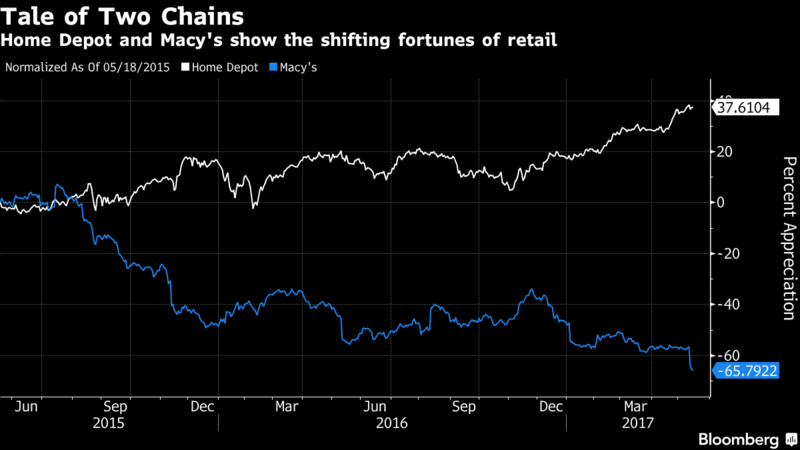-
Profit, sales beat analyst estimates as other stores suffer
-
Home-improvement retailer lifts full-year earnings outlook
Home Depot Inc. dodged the woes of the struggling U.S. retail industry, helped by Americans plowing more money into fixing up their houses.
Earnings handily topped analysts’ estimates in the first quarter and the company boosted its forecast, sending the stock up as much as 2.2 percent in New York. The retailer also said sales so far this quarter have been “very good.”
Home Depot, the largest U.S. home-improvement retailer, is profiting from the rebound in housing prices, which has made property owners more willing to revamp their properties because they see them as a sound investment. That’s helped Home Depot avoid a broader retail malaise, in which falling mall traffic and online shopping has weighed on the industry’s results.
While forecasts for U.S. gross domestic product are mixed, “housing continues to be a growing asset class and our sales thus far in May have been very good,” Chief Financial Officer Carol Tome said on a call with analysts.
Profit rose to $1.67 a share in the period that ended April 30, the company said Tuesday. Analysts projected $1.61, on average. Home Depot also increased its full-year earnings outlook by 2 cents a share.
Home Depot shares rose as high as $160.86 on Tuesday, the biggest intraday advance in more than five months. They had already gained 17 percent this year through Monday’s close
Revenue rose 4.9 percent to $23.9 billion in the first quarter, surpassing analysts’ $23.7 billion prediction. Online sales surged 23 percent. Roofing, flooring and appliances were the best-performing divisions — each growing more than 10 percent — in a sign that homeowners are taking on big projects. That helped purchases above $900 gain 16 percent. The company’s sales to contractors and builders grew twice as fast as those to do-it-yourself customers.
Sales at stores open for more than a year — a key benchmark for investors — rose 5.5 percent. That beat analysts’ 3.9 percent prediction, according to Consensus Metrix. In the U.S., revenue by this measure rose 6 percent.
The Atlanta-based company raised its full-year outlook for earnings per share by two cents to $7.15 and reaffirmed its guidance for sales growth of about 4.6 percent.
The rosy results followed a raft of disappointing earnings from department-store chains last week. Macy’s Inc., the leader of that industry, suffered its worst stock decline since the recession after posting lower sales than Wall Street predicted. Kohl’s Corp., J.C. Penney Co., Nordstrom Inc. and Dillard’s Inc. also disappointed investors.

